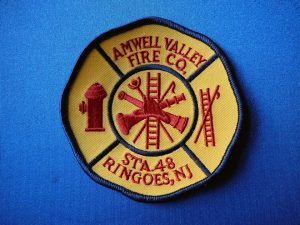Department Faces Trial by Fire in First Blaze Battle

The all-volunteer Amwell Valley Fire Department has a long-standing track record for courage and service in its nearly century-long history. And, in its inaugural fire-fighting effort one Christmas day long ago, it faced a host of challenges and misfortunes, as reported in The Hunterdon County Democrat in January, 1925.
But first a little background. The fire company formed on the heels of an averted disaster in downtown Ringoes. It all began one bitterly cold fall morning. Jonas Pittenger was a 63-year-old farm laborer, and an early riser. Back in the day when coal- and wood-burning stoves heated most Ringoes’ homes, Pittenger’s first morning task was to take care of his stove. He shook the ashes from his stove into a pan, then stepped outside to add it to a growing pile in his shed, just a short walk from his back door. (He planned someday to spread the ashes over his gardens.)
Pittenger returned to his kitchen, shook off the morning chill and sat down to a hot breakfast. Midway through the meal, he glanced outside and saw his shed engulfed in flames. He jumped from the table, ran outside, and with a booming voice that earned him some notoriety, shouted “Fire!”
Neighbor Billy Case, first on the scene, arrived as Pittenger began working an old chain well pump like a man possessed. Other neighbors came too, forming a bucket brigade that efficiently doused the flames.
Afterwards, the folks about town began debating the need for a fire company. The talk eventually led to a meeting at Kirkpatrick Church. More meetings followed, and eventually the townsmen — by a close vote — agreed to start what became the Amwell Valley Fire Company. The company raised enough money to purchase a used chemical fire engine from Lambertville, a no-frills vehicle with two medium-sized chemical tanks mounted on a Republic truck chassis with hard rubber tires.
All that remained was the opportunity to use it, and that came late afternoon, Christmas Day, 1924, as reported by The Democrat.
“As the Ringoes firemen were enjoying the comforts of the fireside, some of them probably dozing under the spell of too heavy indulgence in holiday turkey and other good things, a phone call came to the village storekeeper that Larry Phillips’ barn on the old Bob Fisher Farm west of Rocktown was on fire.”
Village storekeeper Elmer Holcombe also served as fire chief. He reached for his overalls — as he was wearing his holiday attire — and as he threw his leg into his trousers, heard a resounding rip. His foot stuck out where his kneecap should have been. Holcombe ran through his store, searching his commodious stock, until he could find a brand new pair of overalls that fit. Then he rushed out into the cold to sound the alarm.
The town, after some difficulty, had obtained from the Pennsylvania railroad company, a broken locomotive rim as its “bell.” A sledge was used to bang against the rim to sound the alarm — but the sledge was missing. Holcombe tried banging the rim with stones to little effect. So he ran to a nearby garage, grabbed a monkey wrench, and beat the rim with that — hard! After doing so for a while, two firefighters arrived. Unfortunately, neither was “sanctioned with the authority” (according to The Democrat) to drive the firetruck, so the men continued banging the wrench against the rim until a driver arrived.
The driver struggled to shift the gears, but eventually got the truck working and pulled it out of the “improvised fire house,” The Democrat stated, ” but left behind two of the arms that were fastened to the side. They caught in the door . . . it was far better that the side arms should have been ripped off than the door of the fire house.”
The contingent waited for more firemen, and when enough appeared, they all took off in a cloud of smoke toward Rocktown. The Democrat picks up the story: “From Rocktown, the Bob Fisher farm is to the east and a turn to the right was necessary. The road was rough and the first grade encountered proved too much. The machine stalled and there in the road were the Amwell firemen, engine and all.
“Someone thought to look into the gasoline tank, and behold, it was empty! A youthful member dashed to a nearby house to obtain some of the liquid.”
By this time, word came down that the worst of the fire was pretty much over. Other firemen had taken their own cars to the scene and did what they could to help. There was nothing else to do, but turn the truck around and head home.
A debate ensued on whether the truck was out of gas. Some said the driver didn’t know what he was doing; others that the machine was bought second-hand from Lambertville and was “no derned good anyhow.” And “everybody is wondering who stole the sledge that was intended to be used in sounding the alarm.”
“The Ringoes boys will learn by experience. What they want now is a real, honest-to-goodness fire siren or bell, a new fire house with wider doors and they will be all set so that the next time they will be Johnnies on the spot,” the article concluded.
And those things happened. And, over time, the organization earned the renowned reputation that the author predicted.
